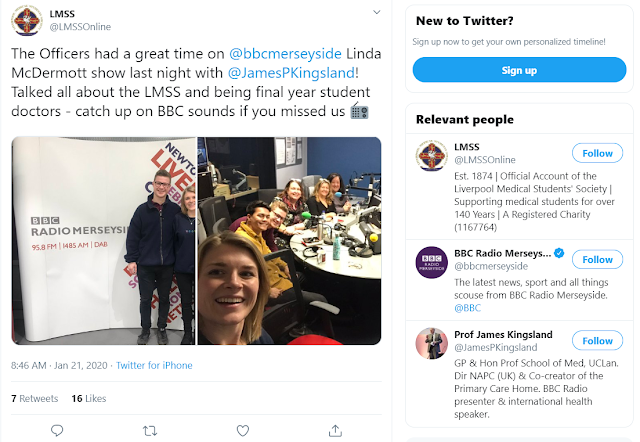Esther Cole
I've been trying to write a history of the Liverpool Medical Students' Society (LMSS) for over a decade. It was one of my reasons for coming to Liverpool in the first place and applying to study medicine - a University open day from which I took home with me the sense of just how friendly Liverpool and its inhabitants are, and a copy of the medical student magazine 'Sphincter'. This vibrant and unusually titled magazine informed me that the 'Raz' or Blue Angel Nightclub had recently been re-carpeted meaning you were less likely to stick to the floor on a night out. With Liverpool as Capital of Culture in 2008, it was almost inevitable that I would go on to make my home here. And only a matter of time before I would become fascinated with the medical history of Liverpool, even more so perhaps than with the career in medicine itself.
As a Liverpool graduate I can appreciate just how much LMSS meant to me in my student days, not just academic revision days, but also the social events, the wonderful musicals put on by 'Artefacts' that allowed medical students to meet people from other year groups and be creative. I also have vivid memories of the Thursday 'ordinary meetings', the strange conventions and traditions that hinted of previous generations of medical students whose political correctness compasses perhaps moved in a separate universe to those of the outside world.
There was controversy in my day. Some people were pro-LMSS, some against. But all medical students had benefitted from the medical student society in some way.
I don't remember exactly how I got hooked into the history. Perhaps it was one caffeine-fuelled adventure where I managed to sneak into the Jack Leggate Lecture Theatre in the Victoria Building (we had recently been banned from using our 'ancestral home' of the last decade; I'd been told it was something to do with the blocking of a plughole and subsequent flooding in one of the bathrooms). I wrote out by hand the names of all the past committee members of over a century. Things are so different now with modern smart phones. There was a sense of nostalgia and great loss. I discovered why the next time I visited the lecture theatre, to find the ancient benches with their medical student graffiti permanently varnished into the wood were no more. A decade of graffiti in the anteroom had been whitewashed. The whole thing had become a museum and yet the history was gone. All that remained was Jack Leggate's name and a small plaque that reads:
"...to commemorate his contribution to the Medical School and abiding interest in its students and their society (LMSS). This plaque was... unveiled by Mrs Grace Leggate at the third joint meeting of the Association with LMSS held on 26th April 1990"
There has been more controversy, a fracture in the relationship between the medical student society and the University which it pre-dated. Certainly times have changed and the LMSS has always adapted and will do so again. It is with a similar nostalgia and sense of something at risk of being lost that I feel inspired more than ever to tell the story of the society's origins, how the individuals there at it's beginning also went on to establish the University and glue the two elements together, how throughout the years other individuals have done the same. Whether that past relationship can be restored only time can tell.
Until then, my hope is to write what I know, what I'm discovering as I go. Just to write. A decade is quite long enough to keep the stories to myself.
As a Liverpool graduate I can appreciate just how much LMSS meant to me in my student days, not just academic revision days, but also the social events, the wonderful musicals put on by 'Artefacts' that allowed medical students to meet people from other year groups and be creative. I also have vivid memories of the Thursday 'ordinary meetings', the strange conventions and traditions that hinted of previous generations of medical students whose political correctness compasses perhaps moved in a separate universe to those of the outside world.
There was controversy in my day. Some people were pro-LMSS, some against. But all medical students had benefitted from the medical student society in some way.
I don't remember exactly how I got hooked into the history. Perhaps it was one caffeine-fuelled adventure where I managed to sneak into the Jack Leggate Lecture Theatre in the Victoria Building (we had recently been banned from using our 'ancestral home' of the last decade; I'd been told it was something to do with the blocking of a plughole and subsequent flooding in one of the bathrooms). I wrote out by hand the names of all the past committee members of over a century. Things are so different now with modern smart phones. There was a sense of nostalgia and great loss. I discovered why the next time I visited the lecture theatre, to find the ancient benches with their medical student graffiti permanently varnished into the wood were no more. A decade of graffiti in the anteroom had been whitewashed. The whole thing had become a museum and yet the history was gone. All that remained was Jack Leggate's name and a small plaque that reads:
"...to commemorate his contribution to the Medical School and abiding interest in its students and their society (LMSS). This plaque was... unveiled by Mrs Grace Leggate at the third joint meeting of the Association with LMSS held on 26th April 1990"
There has been more controversy, a fracture in the relationship between the medical student society and the University which it pre-dated. Certainly times have changed and the LMSS has always adapted and will do so again. It is with a similar nostalgia and sense of something at risk of being lost that I feel inspired more than ever to tell the story of the society's origins, how the individuals there at it's beginning also went on to establish the University and glue the two elements together, how throughout the years other individuals have done the same. Whether that past relationship can be restored only time can tell.
Until then, my hope is to write what I know, what I'm discovering as I go. Just to write. A decade is quite long enough to keep the stories to myself.


Comments
Post a Comment